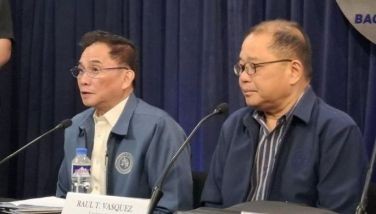Saudi Arabia mulling petrochem plant, expanded refinery in RP
March 23, 2005 | 12:00am
Saudi Arabia is considering expanding an oil refinery in Bataan or Mindanao and building a naphtha-cracking petrochemical plant in another part of the country, Speaker Jose de Venecia Jr. said yesterday.
He said this information was relayed to him by Saudi oil minister Ali Al-Naimi, who was honored with the Congressional Medal of Achievement by De Venecia and other House leaders during his visit on Monday.
During the ceremonies, De Venecia suggested to the visiting oil minister that the Saudi kingdom consider investing in a petrochemical project and an expanded oil processing plant here that could refine oil for domestic consumption and for growing export markets in East Asia.
In response, the visiting official said Petron Corp. could serve as a catalyst for a petrochemical industry here. Saudi Aramco, which Al-Naimi chairs, owns 40 percent of Petron, the largest oil company in the country.
De Venecia also proposed Philippine participation in the gas exploration program in the Saudi peninsula and sought Saudi technical assistance for the establishment of a first-ever petroleum institute at the Palawan State College.
The institute, similar to the Dharan petroleum institute of the Saudis, could produce graduates to be employed in Palawan’s offshore oil fields and in the Saudi oil industry, where more than 8,000 of the 950,000 Filipino workers in the kingdom are currently working.
Several congressmen, including Roque Ablan of Ilocos Norte and Antonio Cuenco of Cebu, joined De Venecia in honoring Al-Naimi, a career geologist who rose from the ranks to become Saudi Arabia’s oil minister and board chairman of Saudi Aramco.
Others who attended the ceremonies were Philippine National Oil Co. president Eduardo Manalac, PNOC director Alberto Pedrosa, Petron chairman Nicasio Alcantara and several Saudi Aramco and Petron officers.
In honoring Al-Naimi, De Venecia cited his professional and business achievements and his "leadership role in Saudi Aramco’s strategic venture into the downstream markets of the global oil industry."
He said these joint ventures would be with Texaco in the United States, S-Oil Corp. in South Korea and Petron in the Philippines.
Aramco employs thousands of Filipino professionals, technicians and workers.
He said this information was relayed to him by Saudi oil minister Ali Al-Naimi, who was honored with the Congressional Medal of Achievement by De Venecia and other House leaders during his visit on Monday.
During the ceremonies, De Venecia suggested to the visiting oil minister that the Saudi kingdom consider investing in a petrochemical project and an expanded oil processing plant here that could refine oil for domestic consumption and for growing export markets in East Asia.
In response, the visiting official said Petron Corp. could serve as a catalyst for a petrochemical industry here. Saudi Aramco, which Al-Naimi chairs, owns 40 percent of Petron, the largest oil company in the country.
De Venecia also proposed Philippine participation in the gas exploration program in the Saudi peninsula and sought Saudi technical assistance for the establishment of a first-ever petroleum institute at the Palawan State College.
The institute, similar to the Dharan petroleum institute of the Saudis, could produce graduates to be employed in Palawan’s offshore oil fields and in the Saudi oil industry, where more than 8,000 of the 950,000 Filipino workers in the kingdom are currently working.
Several congressmen, including Roque Ablan of Ilocos Norte and Antonio Cuenco of Cebu, joined De Venecia in honoring Al-Naimi, a career geologist who rose from the ranks to become Saudi Arabia’s oil minister and board chairman of Saudi Aramco.
Others who attended the ceremonies were Philippine National Oil Co. president Eduardo Manalac, PNOC director Alberto Pedrosa, Petron chairman Nicasio Alcantara and several Saudi Aramco and Petron officers.
In honoring Al-Naimi, De Venecia cited his professional and business achievements and his "leadership role in Saudi Aramco’s strategic venture into the downstream markets of the global oil industry."
He said these joint ventures would be with Texaco in the United States, S-Oil Corp. in South Korea and Petron in the Philippines.
Aramco employs thousands of Filipino professionals, technicians and workers.
BrandSpace Articles
<
>
- Latest
- Trending
Trending
Latest
Trending
Latest
Recommended
January 13, 2025 - 12:00am






























